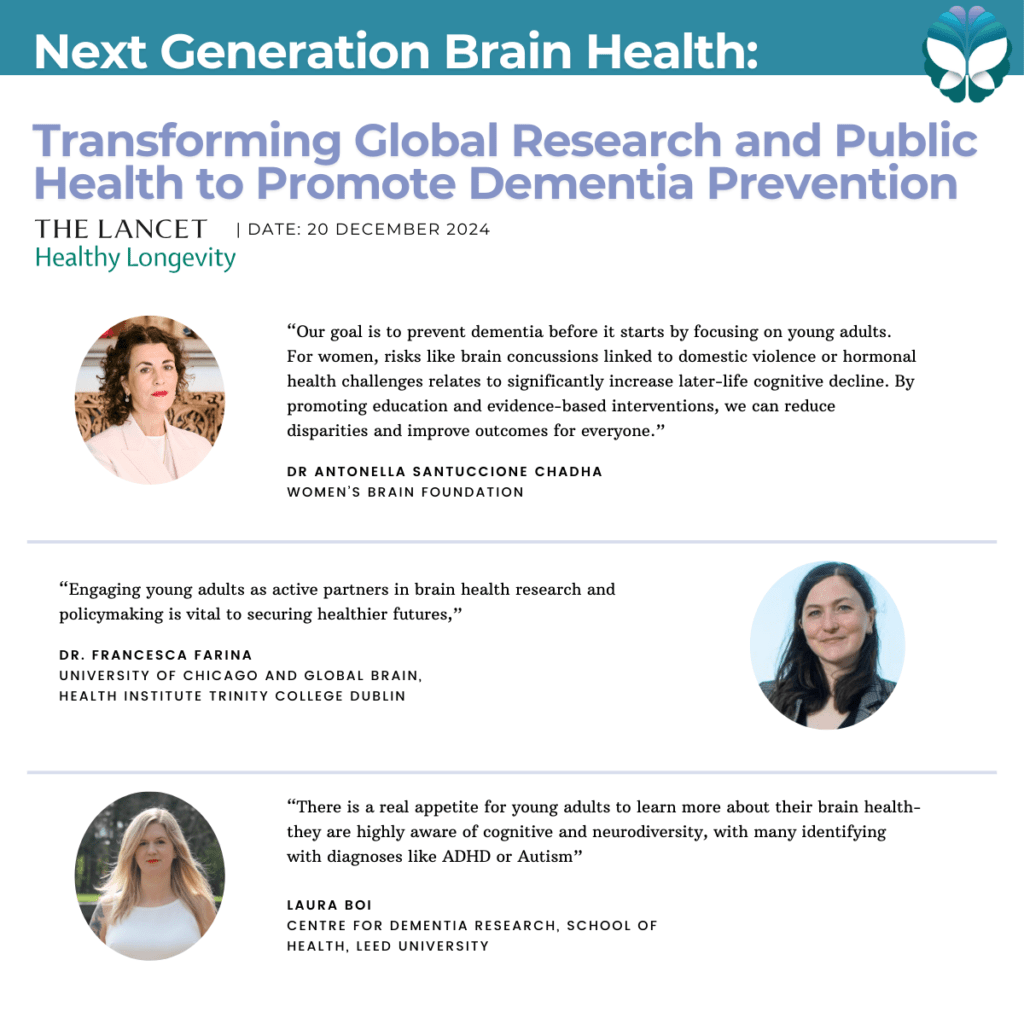New Study Identifies Young Adulthood as Crucial Target for Dementia Prevention
Press Release | Zurich, Switzerland | 19 November 2024
December 20, 2024 — A groundbreaking study published in The Lancet Healthy Longevity by the Women’s Brain Foundation (WBF) and global experts highlights young adulthood (ages 18–39) as a critical but often overlooked period for dementia prevention. The research reveals that key risk factors—such as hearing loss, hypertension, and unhealthy lifestyle habits—are already prevalent in this age group, presenting a unique opportunity for early intervention.
The study calls for:
- Brain health education in schools and tailored public campaigns to empower young adults.
- Gender-specific strategies, addressing issues like intimate partner violence, hormonal health, and brain concussions, which disproportionately affect women.
- Global efforts targeting low- and middle-income countries, where air pollution, limited education, and poor healthcare access amplify risks.
“Our goal is to prevent dementia before it starts by focusing on young adults,” said Dr. Antonella Santuccione Chadha, CEO of the Women’s Brain Foundation. “For women, risks like brain concussions linked to domestic violence or hormonal health challenges relates to significantly increase later-life cognitive decline. By promoting education and evidence-based interventions, we can reduce disparities and improve outcomes for everyone.”
The authors also urge governments to establish national brain health charters with clear timelines and funding commitments. They recommend engaging young adults directly, including creating advisory councils to shape inclusive strategies.
“Engaging young adults as active partners in brain health research and policymaking is vital to securing healthier futures,” said Dr. Francesca Farina from University of Chicago and Global Brain, Health Institute Trinity College Dublin.
“There is a real appetite for young adults to learn more about their brain health- they are highly aware of cognitive and neurodiversity, with many identifying with diagnoses like ADHD or Autism” says Laura Boi, Centre for Dementia Research, School of Health, Leed University, another author of the work. This collaborative study, led by the Next Generation Brain Health team, brings together experts from 15 countries and underscores the urgency of acting early to curb the global dementia crisis.
The full paper, titled “Next Generation Brain Health: Transforming Global Research and Public Health to Promote Dementia Prevention,” is available in The Lancet Healthy Longevity: 10.1016/j.lanhl.2024.100665.
Contact information
Email: info@womensbrainproject.com
Website: www.womensbrainproject.com
About WBF
The Women’s Brain Foundation (WBF) is an international non-profit organization based in Switzerland harnessing the brilliance of a global team of scientist and doctors. Our experts hail from diverse fields, collaborating with patients to integrate sex and gender considerations into precision medicine, from basic science to novel technologies. The WBF is at the forefront of conducting, coordinating, supporting, and advancing sex- and gender-based research with the aim of advancing precision medicine. As both an incubator and accelerator of innovation, WBF is dedicated to promoting breakthroughs in women’s brain health.




